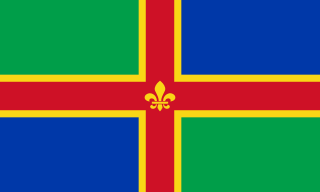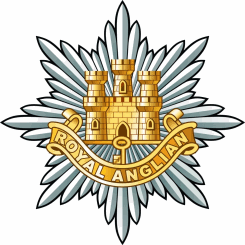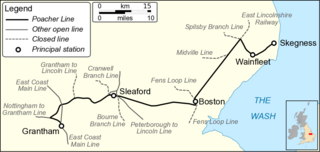See also
- "The Lincolnshire Poacher", a traditional English folk song
- Lincolnshire Poacher (numbers station), a shortwave radio station
Lincolnshire is a county that is mainly in the East Midlands of England
Lincolnshire may also refer to:

Lincolnshire is a county in the East Midlands of England, with a long coastline on the North Sea to the east. It borders Norfolk to the south-east, Cambridgeshire to the south, Rutland to the south-west, Leicestershire and Nottinghamshire to the west, South Yorkshire to the north-west, and the East Riding of Yorkshire to the north. It also borders Northamptonshire in the south for just 20 yards (19 m), England's shortest county boundary. The county town is the city of Lincoln, where the county council has its headquarters.
A numbers station is a shortwave radio station characterized by broadcasts of formatted numbers, which are believed to be addressed to intelligence officers operating in foreign countries. Most identified stations use speech synthesis to vocalize numbers, although digital modes such as phase-shift keying and frequency-shift keying, as well as Morse code transmissions, are not uncommon. Most stations have set time schedules, or schedule patterns; however, other stations appear to have no discernible pattern and broadcast at random times. Stations may or may not have set frequencies in the HF band.

RAF Akrotiri is a large Royal Air Force base on the Mediterranean island of Cyprus. It is located in the Western Sovereign Base Area, one of two areas which comprise Akrotiri and Dhekelia, a British Overseas Territory, administered as a Sovereign Base Area.
BBC Radio Lincolnshire is the BBC's local radio station serving the county of Lincolnshire.

Metheringham is an English village and civil parish in the North Kesteven district of Lincolnshire. The population of the civil parish at the 2011 census was 3,605. It is about 9 miles (14 km) south of the city and county town of Lincoln and 10 miles (16 km) north of Sleaford. The centre of the village is a conservation area.
Appleby may refer to:

The Royal Anglian Regiment is an infantry regiment of the British Army. It consists of two Regular battalions and one Reserve battalion. The modern regiment was formed in 1964, making it the oldest of the Line Regiments now operating in the British Army, and can trace its history back to 1685. The regiment was the first of the large infantry regiments and is one of the three regiments of the Queen's Division.
"The Lincolnshire Poacher" is a traditional English folk song.
"St. Thomas" is among the most recognizable instrumentals in the repertoire of American jazz tenor saxophonist Sonny Rollins. Although Rollins is commonly credited as its composer, the tune is based on the traditional Bahamian folksong "Sponger Money" and the traditional English song "The Lincolnshire Poacher". By way of the folk process, "The Lincolnshire Poacher" evolved into a nursery song in the Virgin Islands, which Rollins' mother sang to him when he was a child.

The Grantham–Skegness line, originally promoted as the "Poacher Line", runs for 55 miles (89 km) between Grantham and Skegness in Lincolnshire, England. Trains on this route originate from Nottingham via the Nottingham to Grantham Line as an hourly through service from Nottingham to Skegness, with slower stopping services at peak times. The line is operated by East Midlands Railway British Rail Class 156 "Super-Sprinter", British Rail Class 153 "Super-Sprinter" and British Rail Class 158 "Sprinter Express" diesel multiple units.

Wainfleet All Saints is an ancient port and market town on the east coast of England, in the East Lindsey district of Lincolnshire, on the A52 road 5 miles (8 km) south-west of Skegness and 14 miles (23 km) north-east of Boston. It stands on two small rivers, the Steeping and Limb, that form Wainfleet Haven. The town is close to the Lincolnshire Wolds. The village of Wainfleet St Mary is to the south.
The Lincolnshire Poacher was a British powerful shortwave numbers station that transmitted from Cyprus from the mid-1960s to June 2008. The station gained its commonly known name as it uses bars from the English folk song "The Lincolnshire Poacher" as an interval signal. The radio station was believed to be operated by the British Secret Intelligence Service. Amateur direction finding linked it with the Royal Air Force base at Akrotiri, Cyprus, where several curtain antennas had been identified as being its transmitter. It consisted of a pre recorded English-accented female voice reading groups of five numbers: e.g. '0-2-5-8-8'. The final number in each group was spoken at a higher pitch. It is likely that the station was used to communicate to undercover agents operating in other countries, to be decoded using a one-time pad.
"The Lincolnshire Poacher" is a traditional English folk song associated with the county of Lincolnshire, and deals with the joys of poaching. It is considered to be the unofficial county anthem of Lincolnshire. It is catalogued as Roud Folk Song Index No. 299.

Lincolnshire Poacher is a hard unpasteurised cow's milk cheese that is generally of a cylindrical shape with a rind resembling granite in appearance. It is made at Ulceby Grange Farm, Alford, in Lincolnshire, England, by craft cheesemaker Richard Tagg. The cheese is matured for between 14 and 24 months, depending on when the milk was collected.
Cherry Ripe is the nickname of a discontinued shortwave numbers station that used several bars from the folk song "Cherry Ripe" as an interval signal. The station, which appears to have commenced transmissions in the late 1960s, is believed to have been controlled by the British Secret Intelligence Service. It is thought to have originally broadcast from a base on Guam, but moved to Australia in 2009.

Sibsey was a railway station on the East Lincolnshire Railway which served the village of Sibsey in Lincolnshire between 1848 and 1964. Withdrawal of passenger services took place in 1961, followed by goods facilities in 1964. The line through the station remains in use as part of the Poacher Line between Boston and Skegness.

Old Leake was a railway station on the East Lincolnshire Railway which served the village of Old Leake in Lincolnshire between 1848 and 1964. It originally opened as Hob Hole and was renamed three times within the first five years of opening. Withdrawal of passenger services took place in 1956, followed by goods facilities in 1964. The line through the station remains in use as the Poacher Line.

East Ville was a railway station on the East Lincolnshire Railway which served the village of Eastville in Lincolnshire between 1848 and 1964. It originally opened as East Ville and New Leake, but was renamed in 1850. Withdrawal of passenger services took place in 1961, followed by goods facilities in 1964. The line through the station remains in use as the Poacher Line

Little Steeping was a railway station on the East Lincolnshire Railway which served the hamlet of Little Steeping in Lincolnshire between 1848 and 1964. It became a junction station in June 1913 when the Kirkstead and Little Steeping Railway was opened to provide a more direct route to Skegness for East Midlands holidaymakers. Withdrawal of passenger services took place in 1961, followed by goods facilities in 1964. The line through the station remains in use as the Poacher Line, although the Kirkstead and Little Steeping Railway closed throughout on 5 October 1970.

Thorpe St Peter is a village and civil parish in the East Lindsey district of Lincolnshire, England, about 1 mile (1.6 km) north-west from the town of Wainfleet.